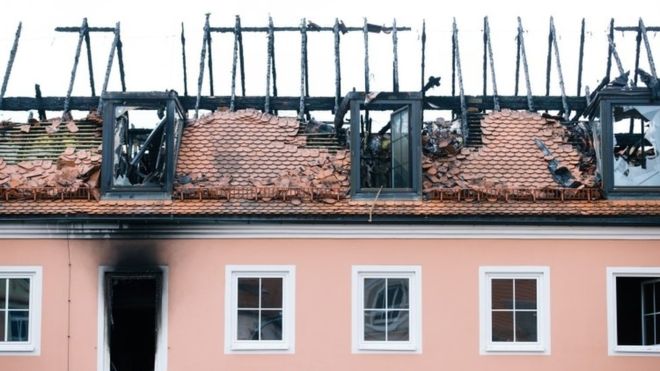Migrant attacks reveal dark side of Germany

To watch the footage that emerged from Clausnitz last week is to catch a glimpse of so-called "dark Germany".
It is not often such events are captured on film.
The images of terrified refugees on a bus surrounded by a baying crowd have provoked revulsion and soul searching.
So has the news that, in the nearby town of Bautzen, people cheered and clapped as a refugee shelter went up in flames after a suspected arson attack.
Germany's justice minister Heiko Maas spoke for many when he described those responsible as "abhorrent and disgusting".
Attacks on Germany's refugee shelters are increasingly common.
Government statistics reveal that last year there were about 1,000 such attacks, five times the number reported in 2014.
Just a few weeks ago a hand grenade was thrown into the grounds of a shelter. The pin had been pulled but the device did not explode.
Many wonder why most of these crimes are perpetrated in what was formerly East Germany.
Some accuse the local government of turning a blind eye to racism and right wing extremism.
Others point to East German history.
"Those who had to survive so many changes in the past 25 years are obviously less stable in their democratic and moral convictions," said former Speaker of the German parliament, Wolfgang Thierse.
But bear in mind the state of Saxony has one of the least ethnically diverse populations in the country.
The people who arrived in Clausnitz last week were the first refugees to arrive in the village at all. This, argue many, is simply fear of the unknown.
There are those who say that such violence represents the extreme edge of what some say is a growing anti-refugee sentiment.
Germany took in more than a million refugees and migrants last year. And they are still coming: more than 90.000 arrived in January this year.
But most Germans are horrified by the attacks. "You are not the people!" wrote one columnist in response to the crowd in Clausnitz who shouted the phrase "wir sind das Volk".
And, while the pictures of burning refugee shelters dominate the TV news, what you rarely see are the tens of thousands of people still quietly volunteering their time and donating their possessions to the refugees.
Even so, there is a growing sense of unease in the country.
Polls reveal that most Germans think it is right to shelter war refugees. But most Germans also feel that the government is no longer in control.
Privately even Angela Merkel's most loyal MPs admit they are worried.
The government can barely agree on how to deal with the vast number of people coming into the country. And at national or European level there is no long term solution.
Most see three regional elections next month as a test for the chancellor.
The anti-refugee party Alternativ Fuer Deutschland (AFD) is leeching support from Angela Merkel's conservatives.
If Saxony went to the polls tomorrow AFD would take 17% of the vote. Ironically the man who ran the shelter in Clausnitz is a supporter.
Thomas Hetze, who has denied tipping off protestors about the arrival of the refugees, has said it is possible to oppose Mrs Merkel's refugee policy while continuing to help asylum seekers.
He has now been replaced.
What some here refer to as the "shame of Clausnitz" has inflamed what is already a febrile national debate over refugee policy.
And as one senior MP told me Germany is running out of time. Mrs Merkel needs to find or negotiate a solution. Fast.
Политика конфиденциальности | Правила пользования сайтом










